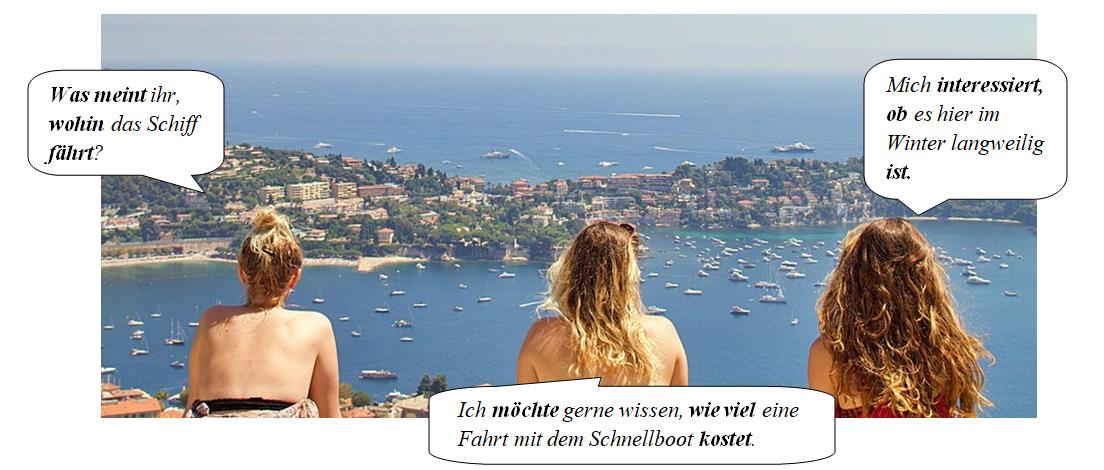In this lesson, you will learn all about indirect questions in German, what indirect questions actually are, what types of indirect questions there are, when and why they are used.
Thank you for reading this post, don't forget to subscribe!CONTENTS
What are indirect questions in German?
Indirect questions with ob
Indirect questions with question word/ W-Fragen
Question or point?
What are indirect questions in German?
Indirect questions are actually interrogative sentences that are used as dependent clauses. They must be introduced with a question word.
The German interrogative adverbs introduce questions and correspond to the English wh- words. They fall into similar groups to other adverbs:
wer? (who?) warum? (why?), was? / (coll.) wieso? (why?), weshalb? (formal) (why?) weswegen wann? (when?) ,bis wann? (until when?, how long? by when?), seit wann? (since when?, how long?), wie lange?( how long?), wie oft? ( how often?) wo? (where?), wohin? (where to?), woher? (where from?), (coll.) von wo? (where from?)
These interrogative adverbs can also introduce indirect questions.
For example:
Er hat mich gefragt, wann der Bus aus Dresden kommt
Ich frage mich, wieso willst du nicht gehen.
Indirect questions with ob
When we want to ask a question without a question word in an indirect way, we use the conjunction ob. In English ob means whether or if. Ob is a dependent conjunction, so the verbs must come at the end of the sentence.
For exaample:
| Direct question | Indirect question |
| Haben wir bald Pause? | Ich würde gern wissen, ob wir bald Pause haben. |
| Gibt es in der Nähe eine Apotheke? | Wissen Sie, ob es in der Nähe eine Apotheke gibt? |
Certain changes occur when you turn a direct question into an indirect one.
For example:
Direct question: Kommt Mia bald nach Hause?
Indirect question: Wissen Sie, ob Mia bald nach Hause kommt?
In the direct question the verb comes first, in the indirect question we added the dependent conjunction ob and therefore the verb must come at the end of the sentence.
| MAIN CLAUSE | DEPENDENT CLAUSE | ||||
| CONJUNCTION | SUBJECT | VERB | |||
| WITH QUESTION WORD | Könnten Sie mir bitte sagen, | wo | der Parkplatz | ist? | |
| Ich würde gerne wissen, | wieviel | eine Parkingkarte | hier | kostet. | |
| Hast du gehört, | wann | der Flug | pünktlich | ist? | |
| WITHOUT QUESTION WORD (WITH OB) | Ich weiß (noch) nicht, | ob | der Film | um 18 Uhr | beginnt. |
| Können Sie mir sagen, | ob | wir | die Tickets online | kaufen können? | |
Main Clauses can be as follows:
Könnten Sie mir bitte sagen, ob …
Wissen Sie, ob …
Hast du eine Idee, ob…
Hast du gehört, ob …
Ich würde gerne wissen, ob …
Ich wollte noch fragen, ob …
Ich weiß (noch) nicht, ob …
Ich frage mich, ob …
Ich habe keine Ahnung, ob …
Ich wollte Sie fragen, ob …
Sind sie der Meinung, dass …
Mich interessiert, …
Was glauben Sie, …
Ich möchte gerne wissen, ….
Sind sie der Meinung, dass …
Mich interessiert, …
Was glauben Sie, …
Ich möchte gerne wissen, …
Indirect questions with question word
When we want to ask a question with a question word in an indirect way, then the rules are the same as for indirect questions without a question word, only here the question words remain the same as for a direct question.
For example:
Direct question: Wann kommt Mia nach Hause?
Indirect question: Weißt du, wann Mia nach Hause kommt?
In a direct question, the verb comes second, in an indirect question, the verb must come at the end of the sentence.
Main Clauses can be as follows :
Könnten Sie mir bitte sagen, …
Wissen Sie, …
Hast du eine Idee,…
Hast du gehört, …
Ich würde gerne wissen, …
Ich wollte noch fragen, …
Ich weiß (noch) nicht, …
Ich frage mich, …
Ich habe keine Ahnung,…
Ich wollte Sie fragen,…
Question mark or full stop
At the end of indirect questions, there can be both a question mark and a full stop, that is, one or the other. We put a question mark when we ask a question, and this can be determined by main clauses
For example:
Weißt du, wann der Film beginnt?
Können Sie mir sagen, wie weit der Bahnhof ist?
Hast du eine Ahnung, wovon der film handelt?
Kad glagol stoji u glavnoj rečenici na prvom mestu, onda stavljamo na kraju rečenice upitnik(?)
Tačku stavljamo kad nešto konstatujemo.
When the verb is in the first place in the main sentence, then we put a question mark (?) at the end of the sentence. We put a full stop when we state something.
For example:
Ich weiß noch nicht, wann sie nach Hause kommt.
Ich frage mich, wie lange das Konzert dauert.
Ich habe keine Ahnung, wie viele Leute auf die Party kommt.
When the verb is in a second place in the main sentence, then we put a full stop at the end of the sentence.
B2 – C1
If the content of the complement is indefinite or interrogative, the complementary sentence takes the form of an indirect interrogative sentence. Questions with a question word can be turned into indirect questions that begin with a question word. If a preposition appears in the question, it comes before the question word. For yes/no questions, the subordinate clause begins with ob.
For example:
Wir sind sehr gespannt auf das Ende des Buches.
Ich bin sehr gespannt(darauf), wie der Film endet.
Ich habe mich nach Arbeitsmöglichkeiten in Deutschland erkudigt.
Ich habe mich (danach) erkundigt, welche Arbeitsmöglichkeiten es in D gibt.
Ich habe mich auch nach der Notwendigkeit einer Arbeitserlaubnis gefragt.
Ich habe mich auch (danach) erkundigt,ob eine Arbeitserlaubnis notwendig ist.
See more:



